The Aspirational Legacy of OGATA Sadako, and The State of Human Security Today
2022.06.21
June 20th is World Refugee Day. It is a day that was established to bring attention to the needs of those forced to become refugees by conflict or other unfortunate circumstances. JICA's support for refugees is based on "human security," a concept that was advocated by the late OGATA Sadako, who served as UN High Commissioner for Refugees as well as president of JICA. We asked two people who have inherited the aspirations of OGATA Sadako for their views on how human security can be passed down and applied today, when facing new threats such as infectious diseases and military invasions.
"The protection of lives, livelihoods, and the dignity of each and every individual—and thinking not only of ourselves, but also of others. That is the definition of ‘human security,’ and it is very simple."
MAKINO Koji, Director General of the JICA Ogata Sadako Research Institute for Peace and Development, gives a succinct description of the meaning of ‘human security’—an idea that can be difficult to grasp.
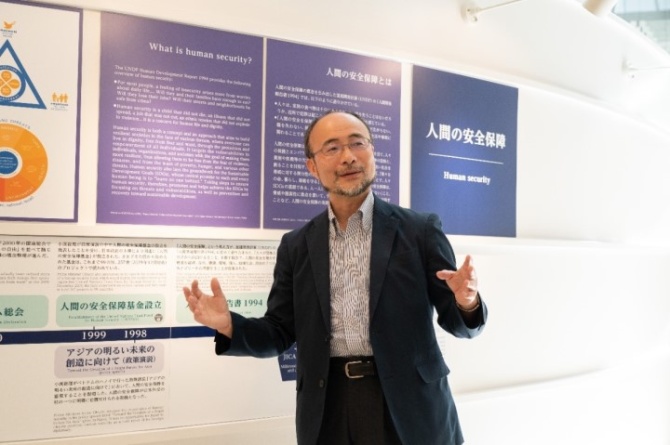
Director General MAKINO Koji discusses human security at the JICA Ogata Sadako Memorial Gallery at JICA Ichigaya, Tokyo.
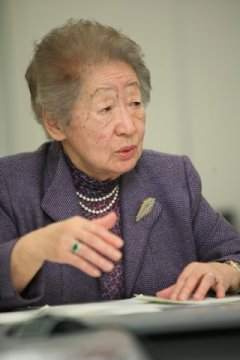
OGATA Sadako, who was the president of JICA
This notion of human security was firmly rooted in JICA's initiatives by OGATA Sadako. Ms. Ogata was for many years involved in helping displaced people as the UN High Commissioner for Refugees. She later served as president of JICA.
Ms. Ogata focused on protecting and empowering the most vulnerable. This approach was based on her firsthand experiences with the pain of people dying during her involvement in numerous refugee-related situations. She was known for doing whatever she could in the moment to help people live more safely and humanely. At JICA, her legacy is still alive and practiced well, even 10 years after she retired as president, and three years after her death in 2019.
The world is facing a number of crises, such as infectious disease on a global scale and military invasions that threaten the international order. It is a time when each of us is called upon to once again consider human security as a personal matter.
The concept of human security was first discussed by the United Nations Development Programme (UNDP) in 1994. Since then it has been the subject of much debate at UN agencies and other organizations. The reason for this is that in the early 1990s, the number of conflicts rose dramatically worldwide. In 2003, the UN Commission on Human Security issued a report advocating for the creation of a world where everyone could live in dignity, free from fear and want. Ms. Ogata was one of the co-chairs of this Commission.
In that same year, when she took on her position as president of JICA, Ms. Ogata focused her efforts on operationalizing this concept of human security. Mr. Makino, then Director of the Human Security Promotion Division, recalls what she used to say, "We don't have time for philosophical discussions about what human security is, or what it means. We have to do whatever we can, right now, for those who are in trouble." After assuming the position of president of JICA, Ms. Ogata often repeated the maxim: “First of all, go into the field.”
JICA formulated "Seven Perspectives on Human Security," which provide concrete guidelines for the practice of human security in the field, and has focused on peacebuilding and assistance for poverty-stricken Africa by supporting those who are most in need. JICA gradually saw this concept become firmly rooted in its policies, confirming its commitment to human security
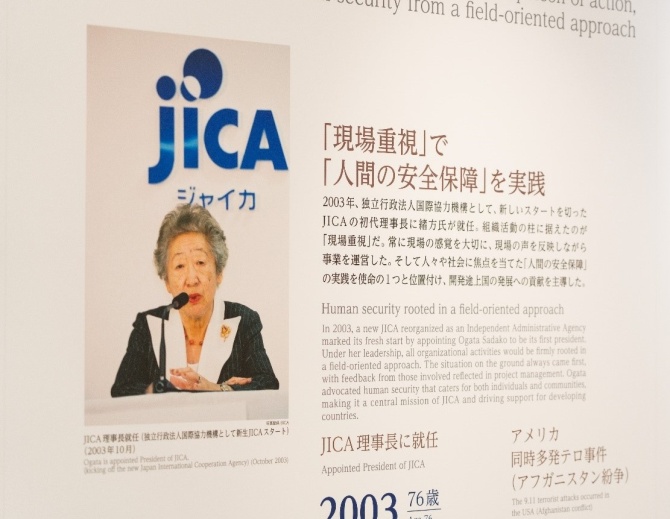
During her time as president of JICA, OGATA Sadako always prioritized work in the field. (An exhibit panel at the Ogata Sadako Memorial Gallery)
Ms. Ogata led the Office of United Nations High Commissioner for Refugees (UNHCR) in providing humanitarian assistance to refugees, and she promoted the concept of human security at the United Nations. At JICA, as the head of a development cooperation agency, she worked to deal with the root causes of crises by supporting the self-reliance of people and communities from a mid- to long-term perspective. She aimed to support the vulnerable, including refugees, and always endeavored to secure people’s safety and human dignity.
Humanitarian assistance supports the livelihoods of people who were displaced due to conflicts by distributing food and supplies. This assistance usually ends when refugees repatriate to their own countries. In her time as the UN High Commissioner for Refugees, Ms. Ogata was keenly aware of the need for development assistance organizations such as JICA to become involved at the early stage of post-conflict reconstruction. She knew that it is difficult for governments to be self-reliant immediately after conflict when they are still in the process of recovery and are not yet able to provide services to their people.
"When I was working as an international NGO staff in post-conflict Rwanda to support the repatriation of Rwandan refugees from Tanzania, I remember how Ms. Ogata, then the UN High Commissioner for Refugees, encouraged development agencies to seamlessly initiate reconstruction assistance after humanitarian assistance to help refugees return home," says KOMUKAI Eri. She is engaged in peacebuilding assistance, including refugee issues, as a JICA Senior Advisor.
Ms. Komukai, as a JICA Senior Advisor, has been involved in bringing her expertise to support the return, resettlement, and rehabilitation of internally displaced persons in the Acholi sub-region of northern Uganda since 2009. She is currently supporting the refugee hosting area in the West Nile sub-region of northern Uganda.
"Ms. Ogata's legacy of bridging the gap between humanitarian assistance and development cooperation has been passed on through the new shape of refugee assistance that JICA is now providing in northern Uganda," says Ms. Komukai.
As conflicts are prolonged, there is no longer a clear shift from humanitarian assistance to development cooperation in many crisis situations. There is a need for collaboration between humanitarian and development assistance to simultaneously support refugees and the societies that accept them, and in Uganda, where many long-term refugees live; there is a transition to a new form of collaboration.
Northern Uganda is hosting a million or so refugees who have fled neighboring South Sudan and the Democratic Republic of the Congo. With the conflict dragging on and many refugees staying in Uganda for more than 10 years, the impact on local residents and communities is increasing. They say that refugees consume local natural resources, and that public services are becoming harder to access because they must share the local facilities.
JICA is working in northern Uganda with the Ugandan government, together with humanitarian agencies such as UNHCR, the World Bank, and the development agencies of other countries, to create a system that enables both local residents and refugees in Uganda to live in safety and peace.
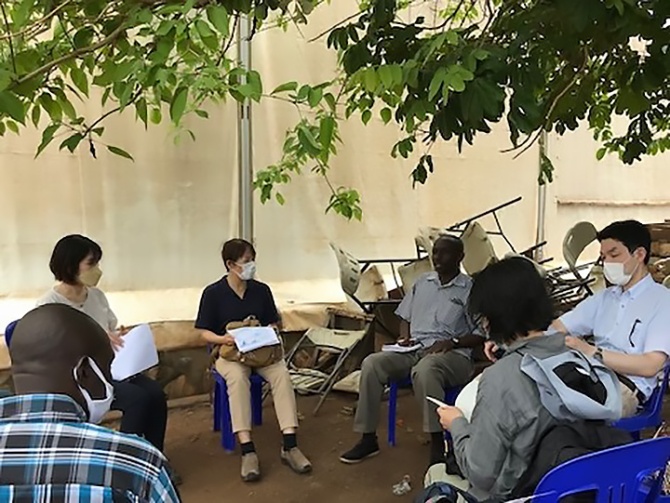
Senior Advisor Ms. Komukai (second from the back-left) interviewing a refugee-settlement commander in the West Nile region of northern Uganda.
Assistance for refugees who are unable to return to their own countries for a long period should not be limited to emergency humanitarian assistance. It should also include mid- to long-term development cooperation, including support for education and skills training. It should help refugees develop their own capabilities, something that will be useful after they return to their own countries. It should be involved in the development of local communities hosting refugees, promoting peaceful coexistence between refugees and host communities, and other initiatives. In all of this, the role of JICA’s cooperation is increasing, according to Ms. Komukai.
"In Uganda, JICA is now working with local governments to provide services that reflect the voices of both sides, so that the refugees who are not expected to return can live with human dignity alongside the local population,” says Ms. Komukai. “I believe that the people who live there will become the main actors and learn to solve problems on their own, which will lead to the sustainable protection of their dignity and self-reliance.” JICA is also promoting cooperation in other protracted refugee settings, such as refugee camps in Palestine, to ensure that the dignity of refugees is protected by strengthening the capabilities of local communities and government agencies.
The number of refugees and internally displaced persons (IDPs) worldwide*1 has increased sharply since 2011. UNHCR announced in May of this year that the number now exceeds 100 million.*2 The problems of conflicts, refugees, and IDPs are also protracted. According to the Global Risk Awareness Survey conducted from September to October 2021*3, 90 percent of those surveyed felt increasingly assailed by multiple threats, including the spread of infectious disease and climate change—which exacerbate feelings of vulnerability and inequality. In addition, Russia's invasion of Ukraine in 2022 poses further threats to not just neighboring countries, but globally. Today, all of humanity is under threat—a situation unseen since the last two World Wars.
*1: Internally displaced persons are those who have been forced to flee their homes—but still live within their own national borders—due to civil wars, acts of violence, serious human rights violations, or natural disasters.
In March this year, the Ogata Sadako Research Institute for Peace and Development released a report titled "Human Security Today." The report once again declared the significance of human security to the world, while taking the changing times into account.
"The response to this report has been great,” says Makino, Director General of the JICA Ogata Sadako Research Institute for Peace and Development. “JICA has received inquiries from Japanese business organizations, student groups, and other organizations inviting us to speak about human security. This would have been unthinkable before. The private sector and civil society are beginning to pay attention to the achievement of human security."
Makino also said, "Human security can be said to support the movement for achieving the SDGs, aiming for sustainable development without leaving behind anyone living on this planet. Taking to heart Ms. Ogata’s belief that, 'Looking ahead to the next 10 years and beyond, if the world becomes peaceful, Japan will also become peaceful,' we will continue to convey actions for the achievement of human security in line with the changing times."
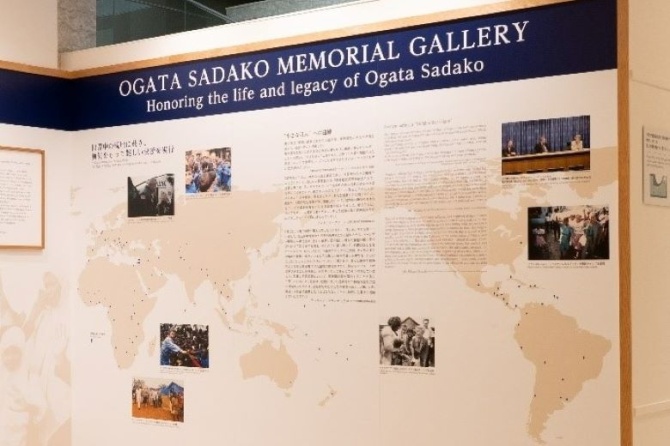
In March 2022, the Ogata Sadako Memorial Gallery opened on the first floor of the JICA Ichigaya Building, the same location of the JICA Ogata Sadako Research Institute for Peace and Development. The Gallery traces Ms. Ogata's footsteps in the practice of human security, highlighted by episodes from her career. In addition to her great achievements, visitors can catch glimpses of -Ms. Ogata’s life through handwritten diary entries, videos, and other important documents.
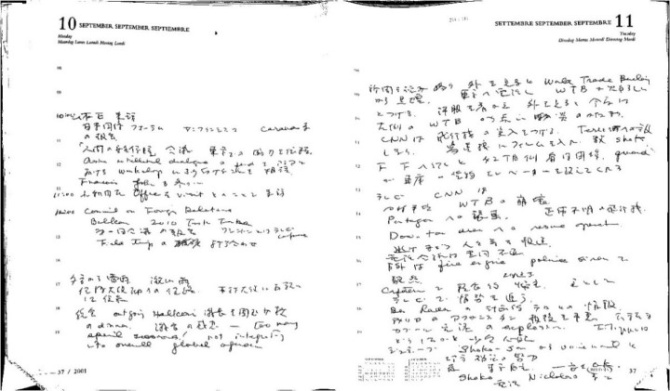
Handwritten diary entries from September 10 and 11, 2001. Ms. Ogata was staying in New York on the day of the terrorist attacks using hijacked airliners. On September 11, she wrote, "After reading the newspaper, I looked outside and saw black smoke from the World Trade Center ... I felt a sense of foreboding about American retaliation against Afghanistan." After this, Ms. Ogata devoted her efforts to supporting Afghanistan.
scroll